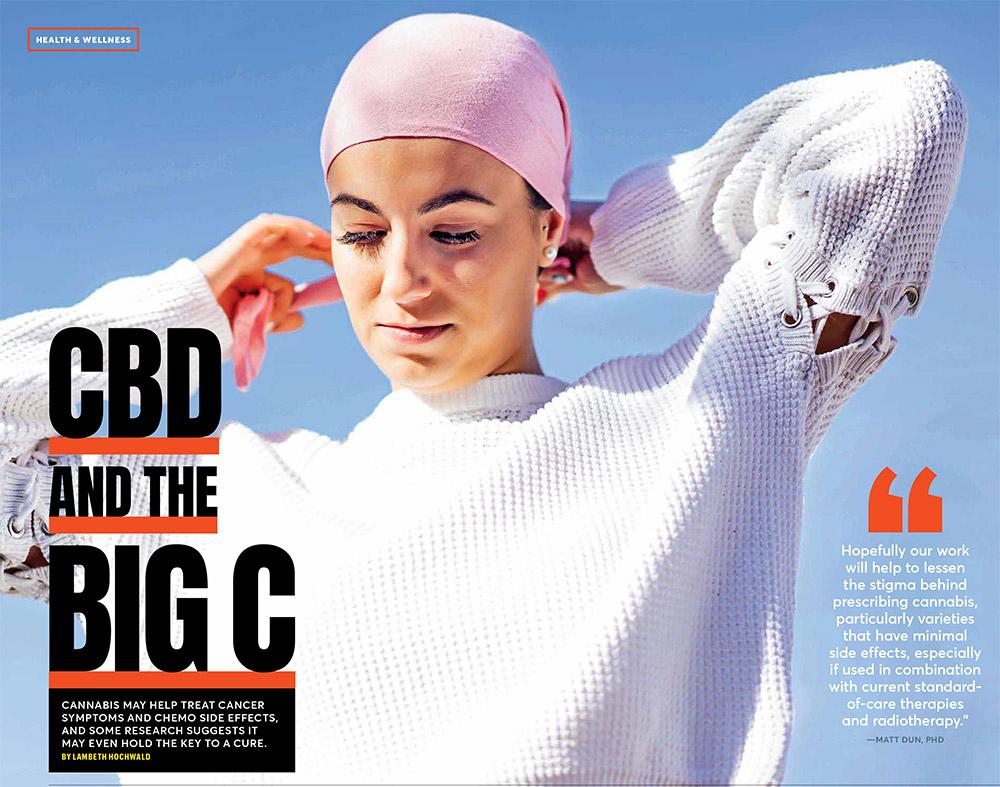
CBD and Cancer - How can CBD help with Cancer & Chemotherapy?
CBD and the BIG C
For cancer patients dealing with the potent side effects of chemotherapy, cannabis can often make a huge difference.
Just ask Patrick Gray, who was diagnosed with lymphoma seven years ago and has undergone six grueling rounds of chemo.
“After my fourth round, I experienced nausea that the standard anti-nausea drugs couldn’t help,” says Gray, the CEO of Pascal Biosciences, a bio - tech company in Seattle that focuses on cannabinoid-based therapies for treating cancer. Meanwhile, “the edible cannabis cookies I ate helped a whole lot.”
That makes sense. Hemp-derived CBD has been proven to help cancer patients better manage such side effects of chemotherapy as nausea, loss of appetite and weight loss, which can significantly weaken the body. Since THC works to boost the appetite, too, marijuana can also help cancer patients recover and feel stronger.
“Cannabinoids may also ease neuropathic pain due to nerve damage,” says Shanon Henry, a medical cannabis research analyst at Medical Marijuana Doctors, a medical cannabis clinic with several locations around the country. “THC has been shown to improve poor appetite due to cancer and cancer treatments, while CBD is also a trusted source that has anti-inflammatory and antianxiety properties, which can ease side effects of cancer treatment.”
As a natural relaxant, “CBD also helps the pain, soreness and insomnia experienced by those going through chemotherapy treatments,” says Nikola Djordjevic, MD, a medical adviser at Loud Cloud Health, a cannabis education website. “The reason CBD is so effective is that it travels through the endocannabinoid system, creating a state of internal balance in the body known as homeostasis.”
How else can CBD help Cancer patients?
FEWER MEDS
CBD can also help by replacing some of the myriad drugs cancer patients usually need to take.
“Cancer patients typically come home with 10 to 15 bottles of medication to help them treat cancer and deal with the side effects,” says Junella Chin, DO, an integrative cannabis physician in New York. “When my patients sleep better, have better morale and decreased pain and inflammation, they can get through chemo or radiation that much better. I always recommend CBD and THC to help them sleep or relax.”
For Chin, this integrative approach is a much better option than many of the traditional drugs.
“I work in conjunction with pain management and the patient’s oncologist,” she says. “They try conventional drugs and we incorporate medical cannabis safely, which can potentially eliminate some other medications.”
One example: Opioids and other mainstream pain medications are known to cause many side effects, including constipation. So then on top of the chemo medications and pain medications, patients are prescribed drugs such as Colace to soften their stools. If a patient is able to use CBD to treat pain, however, they won’t have to deal with constipation.
And that’s just the start. “With a cannabis option, they can also avoid taking Ambien because they can sleep better with cannabis,” says Chin. “And they’re not taking Xanax because their anxiety will be lower and they’re not taking Zofran for nausea. Right there we have four medications that can be eliminated.”

POTENTIAL CURE
While cannabidiol’s record of helping patients ease cancer and chemo symptoms and side effects is backed by a growing body of research and reams of anecdotes, some doctors and researchers think cannabinoids could potentially be a tool to actually curing or curbing the spread of certain cancers.
In the summer of 2020, University of Newcastle research fellow Matt Dun, PhD, published research he’d done in collaboration with biotech company Australian Natural Therapeutics Group (ANTG). They found that high amounts of CBD can kill or inhibit cancer cells without impacting normal cells.
“ANTG wanted me to test [low-THC CBD] against cancer, so we initially used leukemia cells and were really surprised by how sensitive they were,” Dun explained to the university’s news service. “At the same time, the cannabis didn’t kill normal bone marrow cells, nor normal healthy neutrophils [white blood cells]. We then realized there was a cancer-selective mechanism involved, and we’ve spent the past couple of years trying to find the answer.”
In his paper “Can Hemp Help?,” Dun compiled findings after reviewing more than 150 academic papers that explored both THC and CBD as cancer treatments.
“There are trials around the world testing cannabis formulations containing THC as a cancer treatment, but if you’re on that therapy your quality of life is impacted,” Dun wrote. “You can’t drive... and clinicians are justifiably reluctant to prescribe a child something that could cause hallucinations or other side effects. The CBD variety looks to have greater efficacy, low toxicity and fewer side effects, which potentially makes it an ideal complementary therapy to combine with other anti-cancer compounds.”
One thing researchers are looking at closely are G protein-coupled receptors (GPCRs), which are involved in cancer initiation and progression, and the way cannabinoids could potentially target them.
“GPCRs are like gatekeepers that communicate inside of the cells to the outside of the cells,” Chin says. “And 40% of pharmaceuticals, especially cancer drugs, target GPCRs, but we still need more research on the relationship between GPCRs and cannabinoids.”

HOPE FOR THE FUTURE
Even though some preclinical studies have shown that cannabinoids may inhibit tumor cell growth, induce cancer cell death, prevent metastasis or spread of cancer cells, or impede new blood flow to cancer cells, we’re far from stating that CBD can cure cancer.
For the moment, further studies are necessary. “I’ve been in this for 15 years and I can’t say that cannabis cures cancer,” Chin says. “There’s lots more work to be done.”
At Pascal Biosciences, Gray says his company is focusing on ways therapeutics can be involved with cannabis, either as an adjunct or direct treatment. For example, the company is currently hard at work studying whether a cannabinoid-derived product the company has developed will be able to play a large role in treating glioblastoma—the most deleterious of brain cancers.
While the animal data conducted so far with this cannabinoid was “impressive,” Gray says, the goal now is to get the product into a clinical trial, which can take an average of 14 months.
“When we paired our product with Temodar, the main chemotherapy drug available currently for brain cancer, and radiation we saw a nice synergistic effect,” Gray says. Another exciting venture, he adds, will try to advance the company’s discovery from over two years ago that specific cannabinoids— they’ve looked at 400 to date—can activate tumor cells to make them more recognizable by the immune system.
“The immune system is critical for the normal [handling] of invaders, bacteria and viruses and it can recognize cells that have been infected and kill those cells,” Gray says. “It does the same thing with cancer cells. The immune system on a daily basis finds new tumor cells and kills them. Unfortunately, what happens in metastatic cancer is that tumor cells figure out how to get around it. That’s what we’re trying to learn more about.”
Gray says the future use of cannabinoids in cancer research and treatment is more than possible.
“We think that tumor cells will be more recognizable if they’re treated with a cannabinoid,” he says. “The connection that’s made between the T-cells in the immune system and tumor cells requires this machinery for the immune system to see it and kill them. That’s where our research is headed.”
Why Choose 8Labs CBD?

Message from 8Labs Founder & CEO
"We know that our CBD works, but we understand why you might be hesitant. There is a lot of misinformation about CBD out there. Don't worry, we are here to help answer any questions you may have. Welcome to your CBD journey!"
-Erin Lorenzana
Our hemp has a unique chemical composition. It is extremely rich in CBD and other cannabinoids with less than 0.3% THC. Therefore, our products do not have any negative effects associated with marijuana and THC use. With 8LABS CBD, you receive all the positive benefits of hemp’s full spectrum of components, with absolutely zero psychoactive effects.
8LABS CBD products contain the full spectrum of cannabinoids including CBC, CBG, CBDA, CBN and others. Additionally, our extracts contain terpenes - organic hydrocarbons found in the essential oils of plants. Together CBD, other cannabinoids and terpenes all interact synergistically to create what scientists refer to as an “entourage effect” that magnifies the therapeutic benefits of the plant’s individual components—so that the medicinal impact of the whole plant is greater than the sum of its parts.
We have a strict quality control program including on site chromatography reviews and independent lab tests on each batch of product. These reports confirm that the components of hemp remain potent, completely undenatured, and fully active. We maintain high standards of purity and potency to deliver only the highest grade CBD.
Article Source : https://www.pacificcollege.edu/media/CBD%204.pdf



